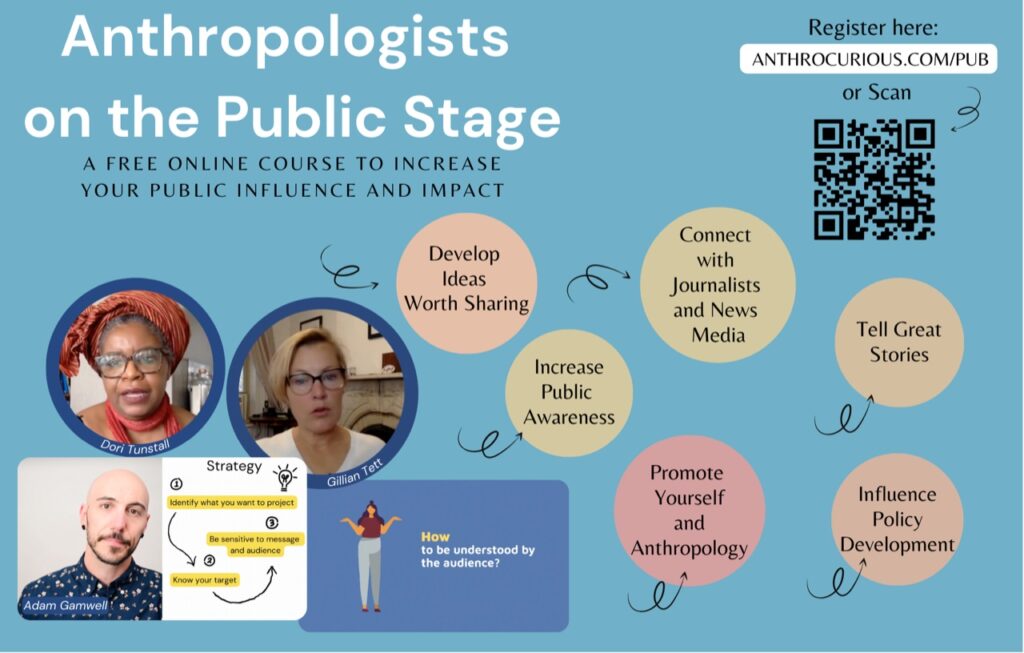Global Initiatives Grant Report – Anthropologists on the Public Stage: A Training Program
Low public visibility has been a longstanding issue for anthropplogy. We continue to see a range of responses from erroneous assumptions about the discipline, confusion between the work of archaeologists and the other subfields of anthropology, and still-too-few “seats at the table” in contributing to public conversations and debates, policy, and governance.
One core issue is that many anthropologists possess neither the knowledge nor the experience to be effective in the public arena. Our team—Elizabeth Briody, Adam Gamwell, Phil Surles, Dawn Lehman, and Jo Aiken—hoped to rectify this issue. With a small Global Initiatives Grant from the Wenner-Gren Foundation, we interviewed 30 anthropologists and adjacent experts already out in the public sphere. We distilled their stories and insights into a free, web-based, modular training program to motivate and coach many more anthropologists and anthropology students to enter the public sphere. After two and one-half years of work, the result was the production of Anthropologists on the Public Stage, completed in November 2022.

The six trainings include short video modules accompanied by downloadable exercises where trainees can practice the lessons they have been learning. They can be accessed at anthrocurious.com.
- Develop an Idea Worth Sharing (09:25) introduces an effective strategy for sharing interesting anthropological insights with members of the general public. The exercise uses a step-by-step approach with questions and templates to bring out the best from the anthropologist’s work.
- Connect with the Media (12:52) encourages trainees to learn about and build relationships with their local media. The exercise involves writing a pitch to an editor or journalist.
- Tell a Great Story (13:52) helps trainees move back and forth between their data and insights to the art and practice of storytelling. The exercise involves identifying story details, developing an outline, telling the story to family and friends to generate feedback, revising the story, and finally practicing the delivery of the story.
- Influence Policy Development (14:12) focuses on the various phases of policy work including developing, implementing, and evaluating policy. The exercise involves identifying a policy-relevant issue from one’s own research or experience, contacting others involved (e.g., policymakers, think tank officials), and addressing specific questions related to the issue.
- Increase Public Awareness (22:36) highlights examples of anthropologists sharing their anthropological insights publicly whether face-to-face, staging an event, or using the media to advantage. The exercise involves identifying and planning a project or activity to help members of the general public learn about anthropology and its value.
- Promote Yourself and Anthropology (14:03) has a dual focus: a) what anthropologists can learn from other disciplines to improve their ability to share what they know, b) how can the principles and techniques found outside anthropology can help shape the stature of individual anthropologists. The exercise involves writing an engaging set of tweets or TikToks about some anthropological insight and its relevance for a particular audience.
To generate interest and excitement about Anthropologists on the Public Stage, we have staggered the release of the six modules so that they would be available on the anthrocurious website between November 2022 to February 2023. This strategy seems to be working as increasing numbers of anthropologists and anthropology students are logging into the website to view the materials. For example, in only nine days the logins rose 63% from 251 (January 23) to 410 (January 31). Testimonials are emerging such as this one: “This is just excellent work. Thanks, again, to you and your team” (Anthropology professor). Perhaps even more intriguing is the number of “impressions” we have received on LinkedIN. One day we had 10,600 impressions! Indeed, every time we post about the release of the next module, the numbers increase exponentially.
One does not need to be an anthropologist to derive benefit from this work. Anyone interested in moving into a public-facing role is likely to find the modules useful. However, if you are an anthropologist or an anthropology student, we know you have the stories and examples to share. By shifting some of time toward educating the general public, we not only help the world understand what anthropology is and offers, but we also have a far greater chance of enhancing our impact by changing perspectives, policies, programs, and practices.